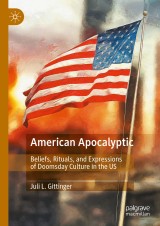Details

American Apocalyptic
Beliefs, Rituals, and Expressions of Doomsday Culture in the US|
117,69 € |
|
| Verlag: | Palgrave Macmillan |
| Format: | |
| Veröffentl.: | 18.07.2024 |
| ISBN/EAN: | 9783031561603 |
| Sprache: | englisch |
| Anzahl Seiten: | 192 |
Dieses eBook enthält ein Wasserzeichen.
Beschreibungen
<p>In this book, Juli Gittinger argues that America’s fascination (obsession?) with the apocalypse is a synthesis of religion, popular culture, and politics in a way that is particular to the US and consonant with mythological-historical narratives of America. As a result, we can identify American apocalypticism as a sort of religion in itself that is closely tied to “civil religion,” that has a worldview and rituals that create identifiable communities and connects American mythology to apocalyptic anxieties. Gittinger discusses how various cultures and groups form as a result of this obsession, and that these communities form their own rituals and responses in various forms of “prepping” or survivalist practices. She lays out an argument for a broad eschatology prevalent in the US that extends beyond traditional religious designations to form an apocalyptic worldview that is built into our narrative as a country, as well as furthered by popular culture and media’s contributionto apocalyptic anxieties. Subsequently, Gittinger uses case studies of apocalyptic events—current or speculative—that reveal how our anxieties about the end of the world (as we know it) inform our culture, as well as religious narratives that emerge from such crises.<br></p>
<p>1. Introduction.- Section 1. TEOTWAWKI.- 2. Cultural narratives of the apocalypse.- 3. Prepping as an American phenomenon. 4. Liberal Preppers.- Section 2. American Anxieties.- 5. Pandemic as apocalyptic event.- 6. Hoping for civil war: the Boogaloo movement.- 7. Climate apocalypse and Eco-piety.- 8. Conclusion.</p>
<p><b>Juli Gittinger</b> is an Assistant Professor of Religion at Georgia College, USA.<br></p>
"Apocalypse is as American as apple pie, and if you've ever wondered why - from prepping to pandemics - you have come to the right book. Since the atomic blasts at Los Alamos, America has always had a special twist, a special take, on the end of the world, and Gittinger's audit of America's apocalyptic practice in this moment is more than just great fun and games, it's a revelation all its own. These apocalyptic anxieties teach us about ourselves, who we are, who we hope to be, and what we think is real and meaningful. Here is cultural philosophy as entertaining as it is enlightening." <br>--<b>Robert J. Joustra</b>, Professor Politics & International Studies, Redeemer University, Canada<div><br></div><div>In this book, Juli Gittinger argues that America’s fascination (obsession?) with the apocalypse is a synthesis of religion, popular culture, and politics in a way that is particular to the US and consonant with mythological-historical narratives of America. As a result, wecan identify American apocalypticism as a sort of religion in itself that is closely tied to “civil religion,” that has a worldview and rituals that create identifiable communities and connects American mythology to apocalyptic anxieties. Gittinger discusses how various cultures and groups form as a result of this obsession, and that these communities form their own rituals and responses in various forms of “prepping” or survivalist practices. She lays out an argument for a broad eschatology prevalent in the US that extends beyond traditional religious designations to form an apocalyptic worldview that is built into our narrative as a country, as well as furthered by popular culture and media’s contribution to apocalyptic anxieties. Subsequently, Gittinger uses case studies of apocalyptic events—current or speculative—that reveal how our anxieties about the end of the world (as we know it) inform our culture, as well as religious narratives that emerge from such crises.<br></div><div><br></div><div><b>Juli Gittinger</b> is an Assistant Professor of Religion at Georgia College, USA.<br></div>
Argues that America’s fascination with the apocalypse is a synthesis of religion, popular culture, and politics Discusses how cultures and groups form as a result of an obsession with apocalypse Uses case studies to show how our anxieties about the end of the world inform culture and religious narratives
"Apocalypse is as American as apple pie, and if you've ever wondered why - from prepping to pandemics - you have come to the right book. Since the atomic blasts at Los Alamos, America has always had a special twist, a special take, on the end of the world, and Gittinger's audit of America's apocalyptic practice in this moment is more than just great fun and games, it's a revelation all its own. These apocalyptic anxieties teach us about ourselves, who we are, who we hope to be, and what we think is real and meaningful. Here is cultural philosophy as entertaining as it is enlightening." <div>--<b>Robert J. Joustra</b>, Professor Politics & International Studies, Redeemer University, Canada<p></p></div>

















